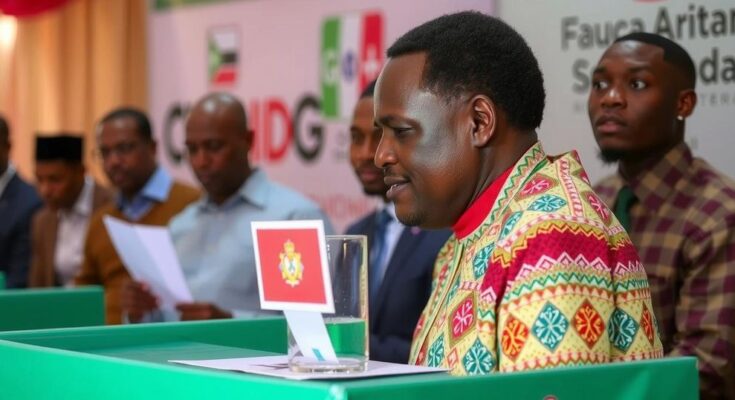Chad holds legislative and local elections boycotted by opposition parties, who describe the voting as a façade for maintaining an autocratic regime. President Mahamat Idriss Deby Itno promotes the elections as vital for democratic progress. Amid security threats and humanitarian struggles, the credibility of the elections remains in question.
Chad is conducting legislative and local elections amid widespread opposition boycott, which is vehemently described by critics as a mere “masquerade”. President Mahamat Idriss Deby Itno, who succeeded his father in 2021, emphasizes these elections as a significant step toward democratic transition. However, the backdrop includes persistent violent attacks from the jihadist group Boko Haram, a disrupted military relationship with France, and regional instability linked to the conflict in Sudan.
Deby junior prevailed in a contentious presidential election last May, receiving 61.3 percent of the vote, which was characterized by the opposition as fraudulent. The current elections, the first since 2011, are viewed by supporters as a chance for generational renewal within the National Assembly. Yet, the opposition alleges that the political environment is heavily skewed in favor of the ruling party, equating participation to legislative apartheid. The leader of the Transformers party, Succes Masra, has voiced this sentiment, highlighting the authoritarian nature of the regime.
Despite these tensions, Minister of Infrastructure Aziz Mahamat Saleh maintains that the elections serve to legitimize the current government and its agenda. Alternatively, Professor Ahmat Mahamat Hassan has expressed concerns about the long-standing autocratic nature of the regime, suggesting that the election process is merely for consolidating power. Furthermore, media coverage has nearly collapsed as journalists seek to protest state-imposed restrictions.
Chad, despite being rich in oil, is among the lowest-ranked countries on the United Nations Human Development Index. The nation has also been grappling with critical humanitarian issues, evidenced by the recent deadly rainy season causing hundreds of deaths and displacing millions.
Chad has a long history of political instability and authoritarian rule, predominantly under the leadership of the Deby family. Mahamat Idriss Deby Itno ascended to power in 2021 following the death of his father, Idriss Deby Itno, who had presided over the nation for thirty years. The current political climate is marred by accusations of electoral fraud, systemic repression, and ongoing security threats posed by jihadist groups. The opposition’s boycott of the elections underlines widespread discontent with the government’s practices, raising questions about the legitimacy and prospects for democracy in Chad.
In summary, Chad’s legislative and local elections are taking place under a shroud of opposition boycott and significant security challenges. While the government frames the elections as a move towards democracy, critics argue that they perpetuate an autocratic regime. As tensions rise, the situation in Chad underscores critical issues surrounding governance, legitimacy, and civil rights in a region grappling with ongoing strife and humanitarian crises.
Original Source: www.barrons.com




